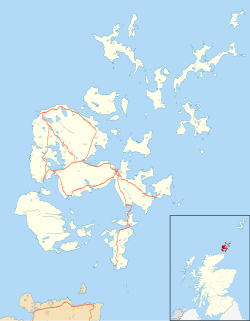| Golgotha Monastery | |
|---|---|
 The monastery viewed from a small tidal island adjacent to Papa Stronsay. | |
| 59°09′N2°35′W / 59.15°N 2.58°W | |
| Location | Papa Stronsay, Orkney Islands |
| Country | Scotland |
| Denomination | Catholic |
| Website | www |
| History | |
| Founded | 1999 |
| Specifications | |
| Materials | Stone |
Golgotha Monastery is a monastery located on the Orkney island of Papa Stronsay. [1] The monastery was founded in 1999, after the monastic community of the Sons of the Most Holy Redeemer purchased the island that year from farmer Charles Ronald Smith. [2]
